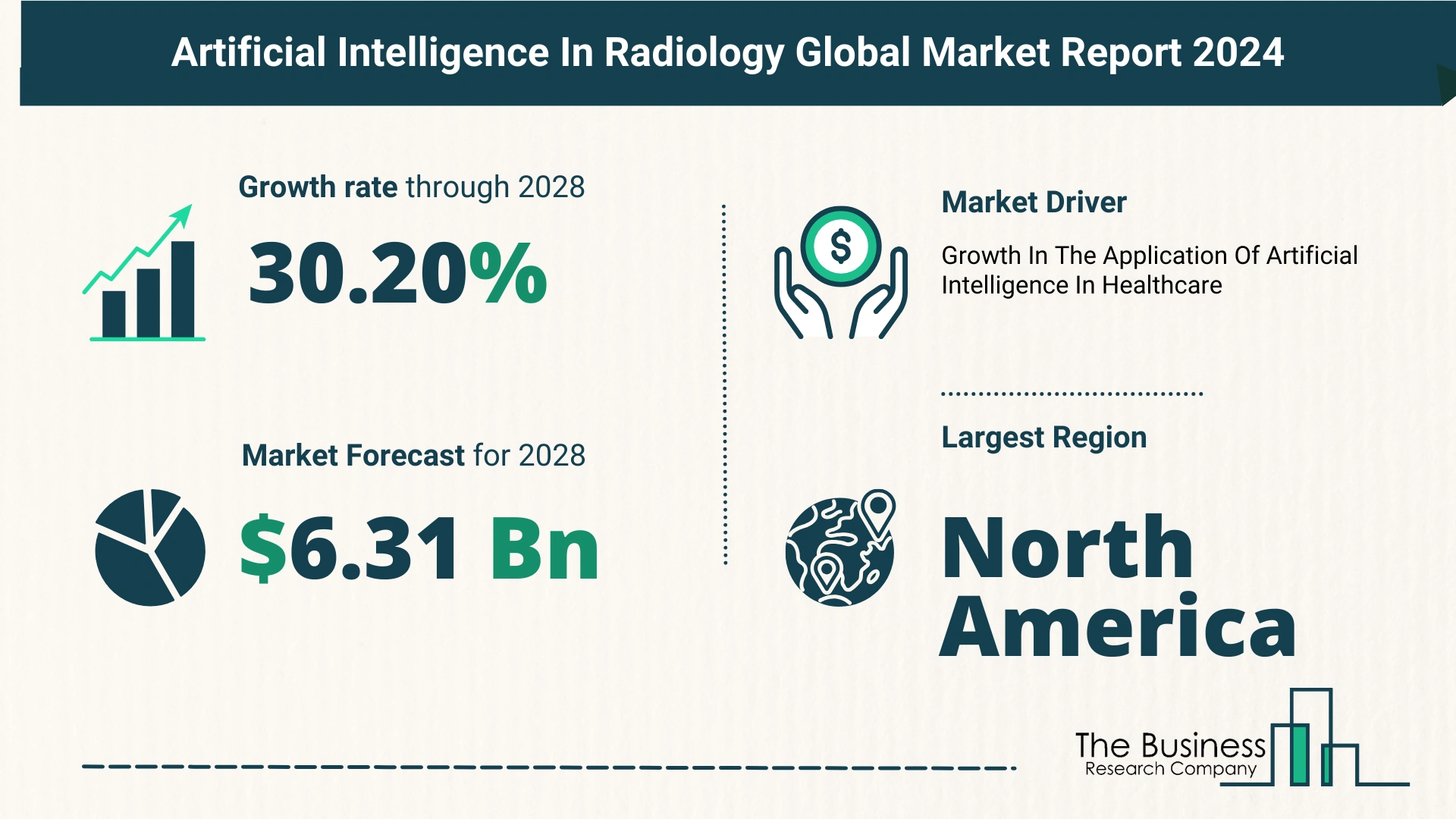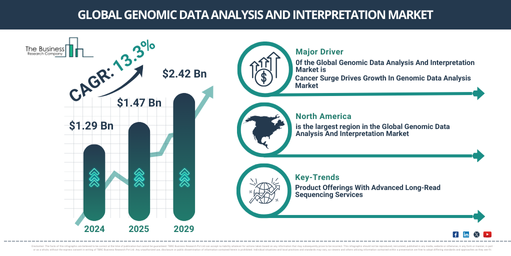Global Artificial Intelligence In Radiology Market Analysis: Estimated Market Size And Growth Rate
The Business Research Company’s global market reports are now updated with the latest market sizing information for the year 2024 and forecasted to 2033
The artificial intelligence (AI) in radiology market is experiencing exponential growth, driven by advancements in AI technologies and the increasing volume of medical imaging data. This blog explores the current market landscape, key drivers, major trends, and future projections.
Rapid Market Growth
- Current Market Size: The AI in radiology market grew from $1.68 billion in 2023 to $2.2 billion in 2024.
- Growth Rate: This growth represents a compound annual growth rate (CAGR) of 30.8%.
- Future Projections: The market is expected to reach $6.31 billion by 2028, maintaining a CAGR of 30.2%.
Key Drivers of Growth
- Increasing Volume of Medical Imaging Data:
- The sheer volume of imaging data requires efficient analysis and management.
- AI assists radiologists by quickly processing large datasets and identifying anomalies.
- Rise of Deep Learning Algorithms:
- Advanced algorithms enhance the ability to interpret complex medical images.
- These algorithms improve diagnostic accuracy and reduce human error.
- Demand for Improved Diagnostic Accuracy:
- AI-powered tools offer precision in detecting subtle abnormalities.
- Enhanced accuracy leads to better patient outcomes and treatment plans.
- Regulatory Approvals and Standards:
- Regulatory bodies are approving AI solutions for clinical use.
- Standards ensure these technologies are safe and effective.
- Cost-Efficiency and Workflow Improvement:
- AI streamlines workflows, reducing the time and cost associated with manual image analysis.
- This efficiency allows radiologists to focus on more complex cases.
View More On The Artificial Intelligence In Radiology Market Report 2024 – https://www.thebusinessresearchcompany.com/report/artificial-intelligence-in-radiology-global-market-report
Future Growth Factors
- Advancements in AI Algorithms:
- Continuous improvements in AI algorithms enhance diagnostic capabilities.
- These advancements allow for more nuanced analysis of medical images.
- Integration with Electronic Health Records (EHRs):
- AI systems integrate seamlessly with EHRs, improving data accessibility and patient care coordination.
- Enhanced interoperability leads to more comprehensive patient records.
- Expansion Beyond Diagnosis:
- AI applications are expanding to include treatment planning and monitoring.
- This broadens the scope of AI in radiology, offering more holistic care solutions.
- AI-Powered Image Enhancement:
- AI enhances image quality, making it easier to detect and diagnose conditions.
- Improved image clarity supports better clinical decisions.
- Enhanced Interoperability and Data Sharing:
- AI facilitates better data sharing between different healthcare systems.
- This interoperability improves collaboration and patient outcomes.
Major Trends Shaping the Future
- Telemedicine and Remote Healthcare:
- AI supports telemedicine by providing remote diagnostic capabilities.
- This trend expands access to radiology services, especially in underserved areas.
- Collaboration Between Healthcare and Tech Companies:
- Partnerships are driving innovation in AI solutions for radiology.
- Collaboration accelerates the development and adoption of new technologies.
- Advancements in Imaging Technologies:
- Emerging imaging technologies are integrated with AI for better diagnostic accuracy.
- These advancements provide more detailed and accurate medical images.
- Quantitative Imaging Analytics:
- AI offers quantitative analysis of medical images, providing measurable data.
- This data supports evidence-based clinical decisions.
- Automated Report Generation:
- AI automates the generation of radiology reports, saving time and reducing errors.
- Automated reports enhance workflow efficiency and accuracy.
Growing Application of AI in Healthcare
- Enhanced Diagnostic Capabilities: AI algorithms improve the ability to analyze and interpret medical images.
- Streamlined Workflows: AI technologies increase efficiency and speed in radiological processes.
- Improved Patient Outcomes: Faster and more accurate diagnoses lead to better patient care.
Key Players in the Market
- Major Companies: Microsoft Corporation, IBM Corporation, NVIDIA Corporation, Siemens Healthineers AG, Koninklijke Philips N.V, GE Healthcare Technologies Inc., Canon Medical Systems Corporation, and others.
- Innovative Solutions: Companies are launching new AI-powered radiology suites to enhance diagnostic accuracy and efficiency.
Focus on New AI Solutions
- Product Launches: Companies are introducing new AI solutions to stay competitive.
- Case Example: In November 2022, Viz.ai Inc. launched an AI-powered radiology suite to analyze medical imaging data swiftly and accurately.
Bayer AG Acquires Blackford Analysis Ltd.
- Acquisition Details: In January 2023, Bayer AG acquired Blackford Analysis Ltd. to integrate AI into radiology workflows.
- Strategic Impact: The acquisition aims to improve patient care and strengthen Bayer’s position in digital medical imaging.
Conclusion
The AI in radiology market is poised for significant growth, driven by technological advancements and increasing demand for efficient diagnostic solutions. As AI continues to evolve, it will play a crucial role in transforming radiology, enhancing diagnostic accuracy, and improving patient outcomes.
Request A Sample Of The Global Artificial Intelligence In Radiology Market Report 2024:
https://www.thebusinessresearchcompany.com/sample_request?id=13591&type=smp



